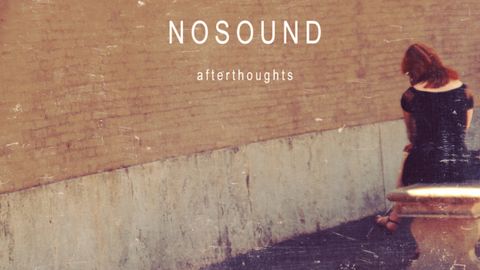Last year’s At The Pier EP introduced a new-look Nosound. Out went the old keyboardist and drummer, in came cello player Marianne De Chastelaine and former Porcupine Tree sticksman Chris Maitland. The musical remit seemed to have changed too.
Most intriguing of the new songs was Two Monkeys, a subtle construct wound around piano, bass, strings and the barely veiled anguish of Giancarlo Erra’s vocals. A post-rock memory poem as bleak as it was beautiful. Afterthoughts is exactly that: a ruminative commentary on regret and consequence.
Like its predecessor, 2009’s A Sense Of Loss, the overriding mood is melancholic, though this time around it’s tempered by shards of anger and, ultimately, hope. As you may have guessed, this isn’t exactly the bounding Italian prog of past masters like PFM of Alphataurus. Instead its minimalism is informed more by the broodier reaches of Bark Psychosis, Porcupine Tree and No-Man.
If that sounds a little too earnest to be any fun at all, one listen to the eight-minute Paralysed should allay that fear. Opening with the softest of piano intros, it builds into a squeal of gusty rock, subsides into ambient quiet, dashes off a little experimental jazz, squeezes in some Italian-language vocals, then ends in a fat roll of surging noise and an extended cry to the heavens. It is, in a word, extraordinary, and serves as a microcosm of everything that Nosound do best.
It appears that the seeds of Afterthoughts’ heightened sense of ambition were sown in the last two years. Not only did Erra set himself the task of creating his richest work yet, but the sudden departure of the two bandmates has resulted in a whole new dynamic. New man Giulio Caneponi is his in-house drummer of choice, but it’s often the guest players who make their distinctive mark here. Maitland really excels on Wherever You Are, riffing on drums with abandon while a recurring keyboard figure provides the central melody.
Meanwhile De Chastelaine, previously heard on 2008’s Lightdark, helps create the textural palette that makes Afterthoughts so convincing. Her cello lines on the romantically doomed Encounter in particular are a masterclass in European gothic, providing a rainy counterpoint to the song’s bright piano fugue. Similarly, She is a tale that essays the bittersweet aftermath of a love affair. It begins with some semi-classical piano, before arcing into a roaring finale of guitars, beats, strings and more besides.
Afterthoughts might not get the party started at a wedding, but it’s well worth hitching up with in the long run.


